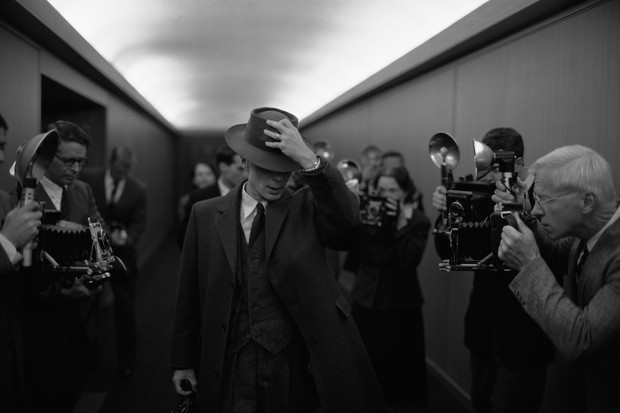Barbenheimer: Beautiful gowns, great gowns.
Now I am become Capital...destroyer of art.
I didn’t exactly do the famed Barbenheimer double bill, but I watched them within a few days of each other and they left me with the same question - why?
I don’t think art needs some greater moral purpose, or answer a deep question about the universe. However, I do feel the need to have gotten something out of it, especially for films which have so much work put into them, but I left both somewhere between empty and frustrated.
This is less a review, and more a series of thoughts and questions. There will be spoilers throughout, but these are not films where plot points are going to make or break your experience.

Oppenheimer was filled with sparks of brilliance from Hoyte van Hoytema’s overwhelming cinematography, to Ludwig Gorannson’s haunting score, to performances like that of Robert Downey Jr, or Emily Blunt and Florence Pugh turning leaden writing to gold. But there was only one scene that really worked for me.
Robert J Oppenheimer (Cillian Murphy) gives a speech to the camp of nuclear scientists at Los Alamos after their nuclear bombs are dropped on Japan, providing the final proof for years of theoreticals. As the speech happens, Murphy conveys deep dissociation and the camera follows suit, with all but his face being out of focus as the shot pulls uncomfortably close and an often blaring film becomes near silent. We hear the sound of the chairs squeaking as people stand up to applaud but we don’t hear the shouts of joy we can see on their mouths, then suddenly the cheers come in like an avalanche and we are drowning in hysteria. As that happens we see a bright light flash and the effects of the bomb as if they were happening to the people doing the cheering. Then people are crying, people are vomiting, people are kissing as Murphy walks through it all like a ghost. It's the one moment in the film where the emotions feel tangible, we move beyond broad Prometheus gesturing and into something we can smell and taste. The whole grotesque emotional apparatus of war, particularly of the American kind, and the incomprehensible horror of such massive asymmetrical violence finally begins to materialise.
For the rest of the film, we have a lot of talking about guilt and sad looks in the eye, but Nolan is a filmmaker who is afraid of humanity. He doesn’t know what to do with us, to paraphrase Brian Phillips- we are too squishy and messy for his immaculately structured machines. So instead we get scientists and politicians who speak in prophecies and quips, all with an artificial grandiose that feels reminiscent of Sorkin on his worse days.
The lack of humanity is egregious with all the women in the film. While there is a degree to which he is limited by source material and focus point (problems of his own making), women in the film have little to no interiority and despite powerful performances from Emily Blunt and Florence Pugh, rarely get much beyond Alcoholic Housewife and Manic Pixie Dream Girl.

Gorannson becomes a co-conspirator with this towards the end. In the third act where Oppenheimer becomes Nolan's martyr, it feels like the score seeks to bludgeon you into believing the relationship he has with his wife is admirable. This is particularly present before and within Blunt's interrogation scene which almost feels like an apology for how painfully little interesting work she gets to do in the film. The score rises to present her as victorious and loyal as she outwits her husband's accusers, but it rings hollow when we haven't been shown the human moments which would make Kitty believe this man was worth saving. A brilliant score cannot make up for the reality that this is not a film structured or written to prioritise women. Nolan's immaculate machine is a patriarchal one with limited moulds.
The immaculateness Phillips describes also starts to answer my next question:
Why does Nolan repeatedly bring up Oppenheimer's Jewishness if we're not interested in it beyond quips?
There are so many interesting connections between Jewish-Americanness and the war. What does it in mean to be a member of a community reeling from a genocide, who makes a weapon of mass murder? Moments with David Krumholtz as Isidor Rabi hint at some of these tensions, but he's given little time to do it in and mostly corny lines. Anything he brings to this is done through his sensitive acting. I simply do not buy that for a film composed of people largely Declaring Their Emotions and Philosophies, only Jewishness should get the subtle treatment. Even Nolan's use of the Prometheus myth is deeply rooted in a culturally Christian neoclassicism, which fits awkardly onto its subject and at times feels more like Jesus or Job than Prometheus.
Also it seems like a Tremendous oversight to me to not mention how deeply connected Red Scares and antisemitism are - even as in our contemporary context dogwhistles like “cultural marxism” ?
Why is Nolan so scared of politics?
There's something almost sneaky about Nolan's approach to politics here.
We have Truman, Lyndon B Johnson, Senate hearings, all sorts of names and faces and prosthetics. We see mentions of the first amendment, the Communist party, world communism versus Soviet communism, but it all feels like set dressing. Instead we focus far more on prophetic statements about abstract moral issues and humanity writ large rather than honing in on the specifics of power, those who possess it and those who execute it, or those who it is executed on. It is clear he has some opinions - like disliking Truman and thinking the government is corrupt or at least full of deeply self centred individuals. However, when it comes to the broader questions of capitalism, imperialism and more which undergird these eras of tremendous political change, Nolan avoids the difficult topics. The ambiguity of his subject's politics as an excuse rather than a point of exploration.
Which brings me to my final question - Why was Nolan the man for the job here?
Nolan doesn't have political or emotional acumen to make a film about the nuclear bomb that has deep meaning. It's a little ironic that a man who so heavily draws on Japanese art has so little to say about the event which so much of it is deeply engaged with. So why bother?

Now onto Gerwig's feature, a very different film with some similar questions.
My main critique of this film is that it tries to have its cake and eat it too and sell you a copy of the cake and offer you a meeting with the creator of the cake where she tells you that the cake has been inside you all along.
If this is meant to be a silly, fun and unthinking film then why does it grind to a halt every half hour to deliver a monologue/moment to remind you of its (can't call itself feminist because Mattel but also desperately wants to be called feminist) credentials?
If the neoliberal feminism is intended to be satirical then why is there zero material critique or payoff? Why is this a world where poor women don't exist? And why are the legitimate critiques of Barbie (see: racism/fatphobia etc) put in mouth of a mean precocious child and discarded as her acting out?
If it's meant to be a camp adventure then why is it so unwilling to go further, and properly loosen itself from reality and overly online millennial humour and push itself fully into the bizarro? This is a Deeply Referrential Text and yet it doesn't seem to pull from the example of Waters or Verhoven or Chitylova who excel(led) at going deep into the absurd and drawing meaning with it.
If this is meant to be a sincere exploration of womanhood then why are all these characters so flat? Both Lady Bird and Little Women function as feminist texts because of their complicated and embodied women - why are they so flat here?
Why is the denouement of womanhood for Greta Gerwig a gynecology appointment?
At the end of her journey after Barbie's had her spiritual moment with her Creator Ruth Handler, she decides to become a real woman. Now a running joke of the film has been that the Barbies and Kens don't have genitals. We're already in tetchy territory there but Gerwig and Baumbach decide to double down with the ending. It's the end of the adventure, Barbieland is fixed, Stereotypical Barbie (Margot Robbie) has chosen to become a real girl and her new friends drive her to an unidentified building, cheering her on as she enters! We wonder where she's going as she strolls in and heads to the desk and then says:
"I need to see my gynecologist"
It's sort of played for laughs, but it's still revealing that the denouement of Barbie's embodiment as a woman is having a vagina et al.
Aside from paying off the previous genital jokes, it exemplifies the #relatable humour that this film overly relies on. Even when you have talented actors and Simu Liu trying their best to make duds land (big up Issa Rae in particular for impeccable timing and delivery) this style of humour is always telling of who you relate to and often grating for those it excludes. The form of womanhood Gerwig finds relatable is overwhelmingly bourgeois, cishet and white. It doesn't matter how many Hari Nefs or Alexandra Shipp's you cast, the narrow vision still shows through. Hell, even pregnant white cis women are excluded in this film, with Midge (Emerald Fennell) being reduced to a weird sight gag.
The lens Gerwig uses also shows itself in the scene where Stereotypical Barbie (Robbie) first experiences misogyny walking down the street. And the apex of that is when she goes to some builders for help orienting herself and they cartoonishly catcall her. The film's construction of misogyny doesn't really push to anything more complex or interesting than that and bargain bin Stepford wives. If this was a film that stylistically was properly synthesising camp with critique and pushing the cartoonishness of the misogyny and the response of the Barbies to extremes then the simplicity could at least be fun - but instead Baumbach and Gerwig are stuck in the mollified #relatable mode.
At points while watching it even felt that the film was actually actively homophobic. Much more time is spent on laughing at misogynistic men for being effeminate/gay acting (see Will Ferrel tickle fight jokes, a LOT of the humour with the Kens), than it does on Queerness - explicit or implicit.
To quote a friend, this is an "irreparably heterosexual" picture - that is who is meant to relate to what's happening here. The film clearly pulls on queer aesthetics and work, whether that's through the fun fashion choices, or the references to The Matrix, and the sort-of dream ballet. However they are unwilling to let Queerness in beyond occasional jokes, casting of buzzy people given nothing to do (see: Ncuti Gatwa and Hari Nef) and the Hays Code-remniscent implications with Allan. Barbie certainly isn't letting Queerness in ideologically. The repeated delivery of extremely watered down Black (often queer) feminist thought about helping men heal from the violence of patriachy reinforces this Heterosexuality. The text here consistently muddles its metaphors around the Kens and their power, while never quite grounding gendered power in anything tangible- which is again frustrating when Gerwig has at least on some level engaged with these ideas before in Little Women. What this results in is a film about reforming heterosexual social dynamics, not about constructing something actually liberatory - in spite of the surface-level queerness throughout and the heavy reliance on queer fans.
My last major question applies to both - Why are we as a culture such fucking marks?
Barbenheimer as a meme was fun and I don't want to moan at people for appreciating the campiness of it all. I wore pink to Barbie, I wore a pensive look as I pretended to understand the dialogue in the first hour of Oppenheimer. These are all things that are fun and I won't pretend like everyone engaging in a meme is being Fully Sincere - that's the first rule of writing about the internet. I'm also not interested in prosthelytising moral purity in our engagement with art. At the same time I'm not willing to let the post-post-ironic obfuscate the material issues here.

Most of the issues and successes of Barbie can be answered by understanding that it's more marketing than movie. The casting alone feels engineered in a lab to generate buzz. While many of these actors are talented (not you Simu Liu), it feels cynical. You have one actor from each marketable demographic, even if they actually do not fit into their role in the broader text (see Cera as Allan or Ncuti Gatwa's whole role) and they're given just enough lines to have someone point and go "There's X". You have Lizzo and Sam Smith (both of whom I have complicated feelings about but we'll get there another day) on the soundtrack but only one (1) fat person on screen and she's a white cis woman with only a handful of lines. Not to mention how anytime we are shown an item on screen we must be given its exact product name and I'm almost impressed they didn't come with a hyperlink.
While I think it would be silly to say any big budget film is allowed to exist for reasons outside of financials, I think that is dialed to 11 with Barbie. It's likely Mattel only allowed this movie to exist, especially with its substantial budget, because they are falling behind in the doll collection market while others do more innovative things.
I think this Caspar Salmon piece has some issues, with its lack of proper engagement with feminist thought on Barbie and somewhat ahistorical elements, but I think the core frustration is something I'm aligned with. From influencers to fandoms, to stan wars, to the shuttering of critical publications by venture capital's greed, we have been shaped into a culture of enthusiasts. In many ways this film and its runaway success is the natural end result of that. Its misleading and anti-critic approach to preview screenings and narrative control don't do anything to disprove that. Every element of the movie is a choice designed with marketing in mind, winking at the critiques it knows will come while never addressing them, and referencing better films without having the courage to take that swings which made them iconic. Even the impressive practcial effects work and set design is beholden to this - with the directive being immaculate recreation not critical engagement. Pastiche without artistic purpose and innovation is just pale imitation - and it's a shame that seems to be enough for many.
Oppenheimer is less aggressively marketed but utterly consumed by the mythos of Christopher Nolan. The place where this strikes me the most is with the sound mixing in his films. It is persistently abysmal. You cannot have a film be reliant on knowing the words people are saying to each other in extended expositional monologues, and then have that crucial dialogue be impossible to parse. That is simply bad filmmaking. However, with Nolan this is understood to be part of some broader masterful craft - or at least a forgivable sin. The way that the film is overstuffed in general and in many parts hard to follow again becomes Art rather than incompleteness. Much like Barbie's constant winking is used to bob, weave and subsume its critiques, Oppenheimer uses spectacle and mythos.
Yet for all its technical magnitude, this is a spiritually cowardly film. Nolan is unwilling to take any of the swings that could threaten his appeal to American audiences. He avoids communism aside from as an abstract free speech issue because you don't get your big passion projects funded by seriously challenging the war machine. And I simply don't think he has it in him anyways.
You also don't get funded if you engaged with Jewish political radicalism and paint complicated histories and lives of Jewish ppl that don't fit into the narrow angles that Western philosemitism allows. Or if you acknowledge that there is/was a significant undercurrent of anti-Semitism within American anti-communism.
I first said this as a joke, but there are clear similarities between Oppenheimer and Hamilton. Both are passion projects that are not-quite-adaptations of a single biography of a paradigm shifting American historical figure. Both have impressive displays of craft that paper over the flaws of their creators. Both somewhat critique the US and its politics but can't bring themselves to deliver a killer blow. I don't think the Nolan picture is as cravenly revisionist as Hamilton, but l not as far off as he'd perhaps like it to be. Because it feels that unlike Miranda, Nolan full-well knows that a proper reckoning is in order - he's just afraid to be the one who points the gun.
I don't entirely know where all those whys leave us. The Barbie movie has made over a billion dollars. Nolan receives widespread political acclaim. The Hollywood machine churns on. Studios continue to hoard money they don't have and the spaces for voices outside of studio narratives contract and contract. But there are glimmers of something different. The strikes that go on as I write this threaten to shake these homogenising corporate machines that choke art. People are still finding ways to make and talk about and think outside of the narratives they are fed. Subversive work continues to be created and exist and the world moves in ways the immaculate machines could never hope to predict or capture - and there’s hope in that at least.
As always you can hit me up if you have any thoughts and feelings about this - contact deets on my website - https://tayowrites.persona.co/! Always appreciate your support whether that’s verbal, financial (ko-fi.com/tayowrites) or whatever else.
Add a comment: